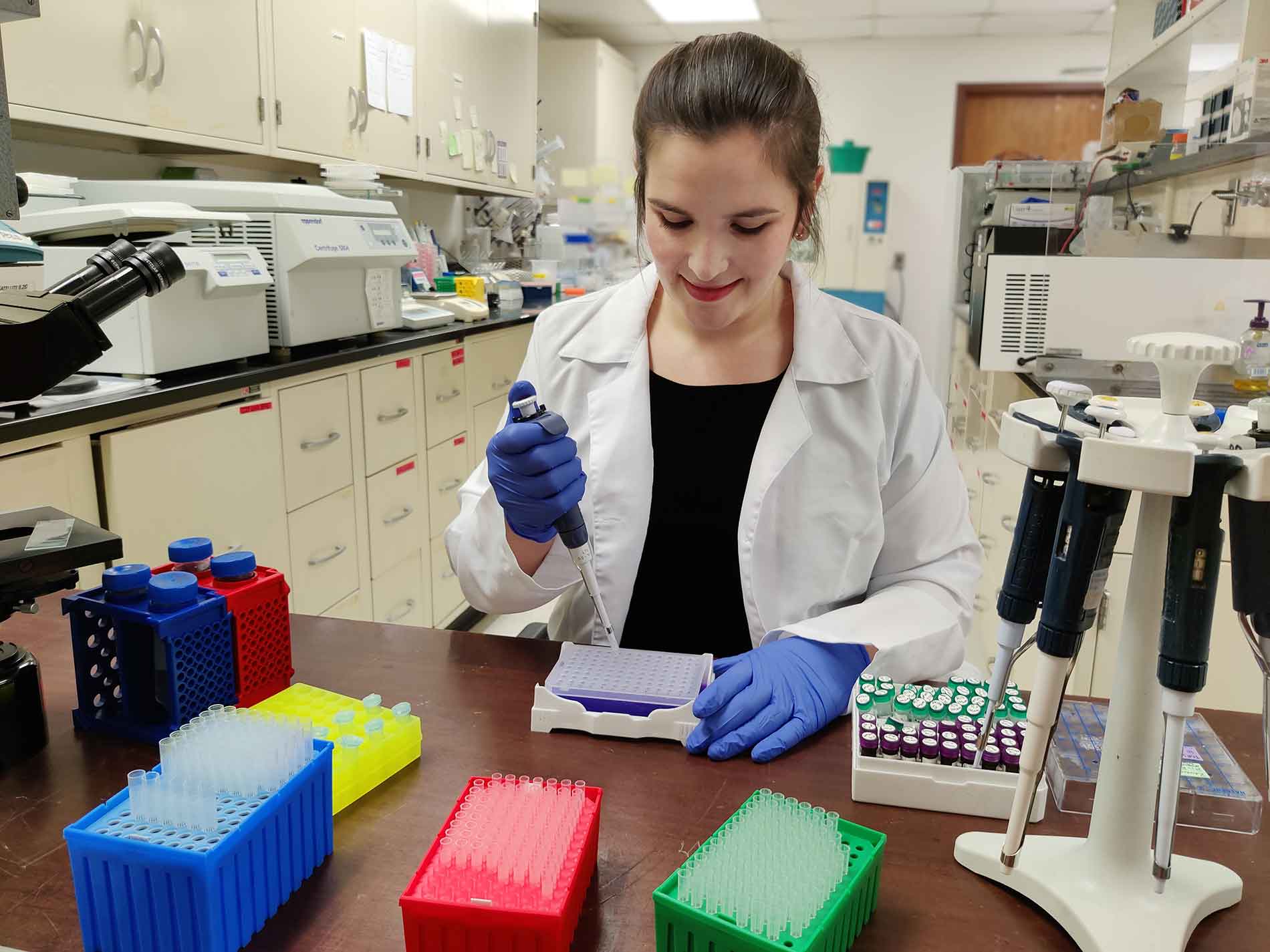Giseli Valentini
Growing up on a farm in southern Brazil, Giseli Valentini always had a strong connection to agriculture. Because of her family connection to farming, she chose to pursue a career in agronomy, with the expectation of one day becoming an agronomical extension agent. She never pictured herself as a scientist.

Giseli Valentini, Ph.D., conducted research at the Soybean Genomics and Improvement Laboratory at the USDA-ARS facility in Beltsville, Maryland.
However, when Valentini began pursuing her bachelor’s degree at the Regional Community University of Chapecó, she was first introduced to the science world and became fascinated with the scientific applications of agronomy.
“My interest in science began during my classes on plant breeding. Everything I learned about genetics and plant breeding was just captivating,” said Valentini. “I became so interested in learning more about this subject that I asked my professor if I could be part of his research group. The experience was so great that I was inspired to pursue graduate studies and become a scientist.”
After receiving her bachelor’s degree in 2008, Valentini went on to receive her master’s degree in vegetal production from Santa Catarina State University in 2011, followed by her doctorate in genetics and breeding from the State University of Maringá in 2015. More recently, Valentini gained valuable experience by applying her knowledge of plant genetics and breeding during a fellowship with the U.S. Department of Agriculture (USDA) Agricultural Research Service (ARS) Research Participation Program.
The USDA ARS Research Participation Program provides opportunities for students, postgraduates, established scientists and faculty to participate in programs, projects and activities at ARS-designated facilities to help ARS solve agricultural problems of high national priority.
For her appointment, Valentini is stationed in the Bean Laboratory at the Soybean Genomics and Improvement Laboratory at the USDA ARS Agricultural Research Center in Beltsville, Maryland. Under the guidance of her mentor, Marcial Pastor-Corrales, Ph.D., Valentini uses genomic technologies to discover, study and use rust resistance genes for bean production.
The common bean is the most important legume for direct human consumption. It provides great nutritional value to millions of people, particularly in Brazil, other Latin American counties and Africa. Bean consumption also confers health benefits, as well as environmental, social and economic benefits.
Unfortunately, common bean production is constrained by several diseases that reduce yield and quality of grains and pods. Rust, one of the most devastating diseases in common bean is rust, is a disease caused by a fungus with broad virulence diversity, meaning that the fungus has many different variants.
Effective management of bean rust can be accomplished by utilizing genetic resistance. Several different genes for resistance to rust have been identified, and they can be used effectively in breeding programs worldwide to develop common bean cultivars with resistance to the high-variable pathogen causing rust. However, the development of cultivars with genetic resistance is not an easy process. These pathogens continuously produce new virulent strains, hence, bean varieties with effective resistance must have two or more resistance genes.
“Fortunately, we have developed and continue to develop new molecular markers, or DNA-based markers, that can be used to improve and accelerate the gene-transfer process known as gene pyramiding,” said Valentini. “We use several approaches to develop highly specific and accurate molecular markers that can be used in a breeding program to select plants that contain a specific gene for resistance.”
Through her research with ARS, Valentini is contributing to the sustainable and reliable production of one of the most important foods in the world. She is grateful for the opportunity to learn from and collaborate with skilled researchers, as well as develop her own research skills.
“This international experience was crucial for my career progress in science,” said Valentini. “My experience in this program has been an unparalleled opportunity to advance my knowledge in genetics, genomics, and breeding for disease resistance in the common bean.”
Valentini encourages others who are seeking to expand their horizons and improve their knowledge to apply to the ARS program and to work hard to achieve their dreams despite any obstacles they may encounter.
“I believe that the difficulties and limitations are not the defining factors in our lives,” said Valentini. “To make our dreams come true, we must look forward and be persistent in our objectives.”
When her fellowship concludes, Valentini plans to continue exploring genetic resistance in plants with the goal of making resilient crops widely available for farmers and to help produce food for millions of people in the world.
The USDA ARS Research Participation Program is funded by USDA and is administered through the U.S. Department of Energy’s (DOE) Oak Ridge Institute for Science and Education (ORISE). ORISE is managed for DOE by ORAU.